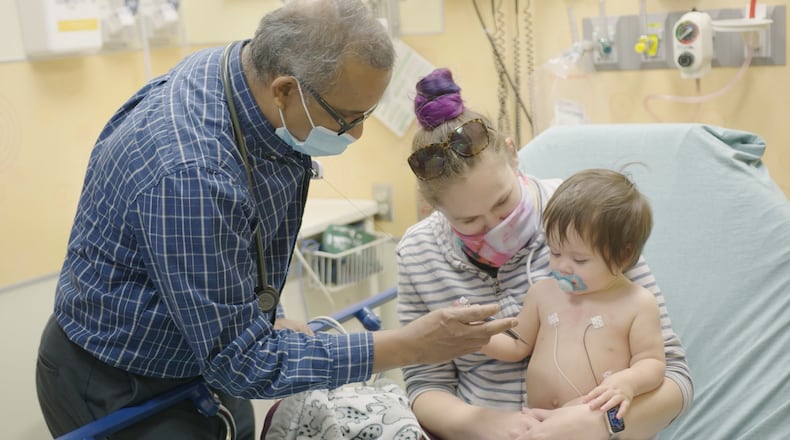“This increase, while dramatic, has been in line with what we’ve seen across the nation,” he said. “...The robust of return of RSV and influenza is not entirely unexpected given the similar pattern reported in the southern hemisphere, which just emerged from its winter.”
Children’s hospitals across the state have seen records broken in the number of sick kids who have come in with RSV or other respiratory illnesses. Dayton Children’s Hospital has seen a record number of children in its emergency departments, urgent cares, and inpatient units seeking care for RSV, flu, COVID, and other respiratory viruses that are circulating.
“We are above 100% capacity,” Dr. Miri Lader, a pediatrician with Dayton Children’s Hospital, said on Tuesday. “We’re seeing mostly respiratory infections.”
Symptoms of RSV include a runny nose, decrease in appetite, coughing, sneezing, fever, and wheezing, according to the Centers for Disease Control. While most RSV cases resolve on their own, young children, older adults with chronic medical conditions and those with compromised immune systems are at risk for more severe illness.
Parents should pay particularly close attention to babies, Vanderhoff said, and should seek emergency care if they notice unusually fast breathing, ribs pulling with each breath, a bluish color to the baby’s lips or face or a fever of 100.4 degrees or higher.
Dayton Children’s Hospital has been accommodating the surge in RSV cases and other respiratory illnesses by getting creative with its space, such as using recovery rooms for additional space for those seeking emergency care. A Dayton Children’s spokesperson said they had to reschedule a handful of non-emergency surgeries that would require an overnight stay during this current surge, but other processes have not seen much disruption locally. There have also been increased wait times.
Lader said they are prepared to deal with RSV and respiratory illnesses, saying the current situation is within their wheelhouse.
“None of this is outside of our comfort zone,” Lader said. “RSV is something we see every single winter.”
Doctors are still seeing RSV and more respiratory illnesses earlier in the season, though, and with a higher peak. They were not able to say when they expected the number of illnesses to drop. Lader said while there is no vaccine for RSV, vaccinations against the flu and COVID-19 are encouraged.
“We can protect our babies from COVID and the flu by vaccinating those around them,” Lader said.
Dr. Rustin Morse, chief medical officer of Nationwide Children’s Hospital, said this year has been difficult for hospitals because RSV cases increased earlier and the volume is higher than previous years.
“We are all experiencing exceptionally high volumes in our emergency departments, exceptionally high volumes in our pediatric ICUs and exceptionally high volumes on the floor for admitted patients,” he said.
As a result, hospitals are expanding urgent care and emergency department capacity to care for more patients and cancelling scheduled surgeries that can be postponed, Morse said. Hospitals in Ohio have also had to turn down transfer patients from as far as Virginia and Missouri.
Influenza is continuing to takeoff this season as the state of Ohio has seen an increase of approximately 34.82% in influenza-like illness in outpatient data, according to the Ohio Department of Health’s latest flu activity data. Confirmed hospitalizations related to the flu are also up over 26% throughout the state.
Montgomery County remains the highest in terms of influenza-associated hospitalizations with 83 hospitalizations, or 21.8% of all influenza-associated hospitalizations. There have been 53 hospitalizations in Hamilton County, 41 in Franklin County, 13 in Cuyahoga County, and 20 in Clermont County.
Elsewhere in the Dayton region, there have been 23 hospitalizations in Clark County, 12 in Butler County, 13 in Green County, and only a few in other local counties. The flu season typically goes through March, and it lasted through May last year.
Flu-related hospitalizations in Greene County are about where they are normally in season, but the health department is still encouraging good hygiene and getting vaccinated ahead of the holiday season. Flu vaccinations are available for those who are six months old and older.
“With the colder weather, it’s going to push you indoors,” said Laurie Fox, public information officer with Greene County Public Health, about the increased risk of spreading respiratory illnesses.
Greene County Public Health is also preparing for Thanksgiving gatherings by holding a drive-through giveaway of free COVID-19 test kits. It will be held from 12:30 p.m. to 2:30 p.m. held on Monday, Nov. 21, at the health district’s main office located at 360 Wilson Dr. in Xenia. Test kits will be given out while supplies last.
Health officials also recommend staying home when sick, particularly avoiding large holiday gatherings if you or a child are sick.
“If you have a sick child, don’t bring that sick child to a party,” said Dan Suffoletto, public information manager with Public Health - Dayton and Montgomery County. “We want to make sure people are monitoring their symptoms.”
Health departments also recommended continuing to wash your hands, particularly when eating and preparing food.
“You want to practice good hygiene all the time,” Suffoletto said.

